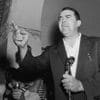
In 1976, The Education of Little Tree was published as the autobiography of a little known southern author, Forest Carter. Carter’s earlier novel, Josey Wales, had been turned into a successful film by actor Clint Eastwood. Little Tree was the story of Carter’s childhood as an Indian boy who grew up on a reservation. He was orphaned, then taken away from his grandparents and raised by missionary types. He got through it, though, and got through it well.
But the Education of Little Tree wasn’t what it seemed. It wasn’t even an autobiography, but a work of fiction. And Forest Carter wasn’t the author’s real name. The book was, in fact, the work of a notorious Alabama Klan leader, as Greg Bass has that story for WBHM’s Tapestry.
“I was assigned the Education of Little Tree in a psychology class to analyze an autobiography.”
That’s Film maker Douglas Newman.
“And my father said to me I think that book is a fake, a hoax. I remember reading something in the New York Times. I did some research and found the op Ed from Oct. 1991 that exposed the book as a fake. I brought this to the attention of my psychology professor and he brushed me off and said that’s never been proven. I was disappointed by his reaction so I went to another professor of mine in American Studies who spent time as a kid in Montgomery and remembered Asa Carter and he encouraged me to do a senior thesis on it. “
Now, 20 year after that school assignment, Douglas Newman has produced The Reconstruction of Asa Carter, a documentary that traces Carter’s evolution from talk radio host, Klan leader and speech writer for Alabama Governor George Wallace to award winning author. In the early 60s, he crafted some of Wallace’s most memorable lines. And on the radio, Asa Carter gave free range to his racist views.
“The nigra can get away with anything in the schools. He can insult them, he can knife them, he can curse, he can tear up the desks. You ask the little children who are being knifed and brutalized and the little girls who are having their future Christian homes…”
“At first it seems such a big divide between Asa and Forest.”
Marco Ricci directed the film.
“But as a filmmaker you try to look for a through line for a story. He was always a talented writer. He always had a gift for words. And perhaps more importantly, he always knew what his audience wanted to hear.”
When Wallace ran for Governor in 1970, his views on race had moderated so Carter decided to run against him as the segregation candidate. He came in dead last. Disillusioned with politics, Carter decided to focus on fiction writing. With the success of the film The Rebel Outlaw Josey Wales, he also realized he needed a new identity to hide his racist past. Enter – Forest Carter.
“It starts initially as a pen name.”
Again, director Mario Ricci.
“As he’s getting more success and people are wondering who are you and why haven’t we heard of you before you wrote this great book and a Hollywood movie and he has to fill in the background of who he is and he’s smart enough to realize that if he admits to his true background that they’re probably going to have some problems with him. So he starts making up this fake autobiography that eventually turns into the Education of Little Tree.”
By the time of his death in 1979, Forest Carter was a successful author and the Education of Little Tree was a best seller. 12 years would pass before the article in the New York Times would reveal that Asa and Forest Carter were one and the same. After all these years, some still wonder if he ever changed his racist views. Did Asa Carter succeed in reinventing himself? Filmmaker Douglass Newman…
“A testament to his success is the fact that we are even still debating whether or not he changed. The Education of Little Tree is still taught in schools, it’s still found in the biography or the Native American section of bookstores, it was on Oprah’s booklist until 3 or 4 years ago. I think he succeeded wildly because after all these years, we’re still asking the question.”
The film The Reconstruction of Asa Carter will air on PBS in the spring. Below, is an Edward R. Murrow-produced film about the desegregation of Clinton, TN.
~ Greg Bass, December 6, 2011

